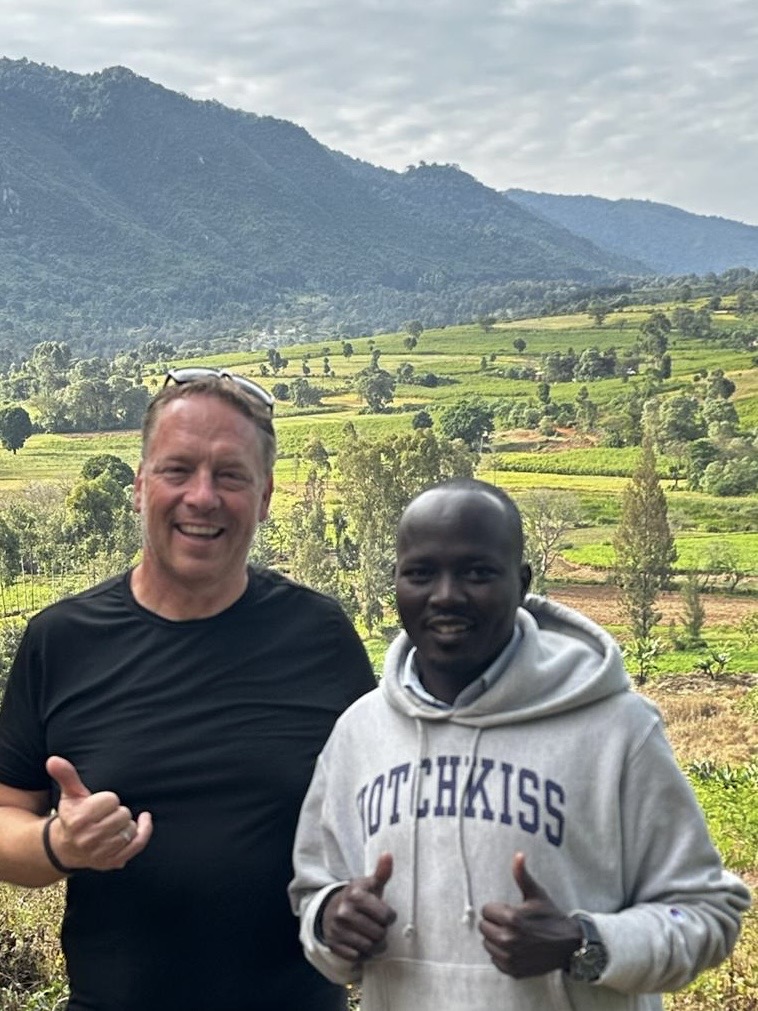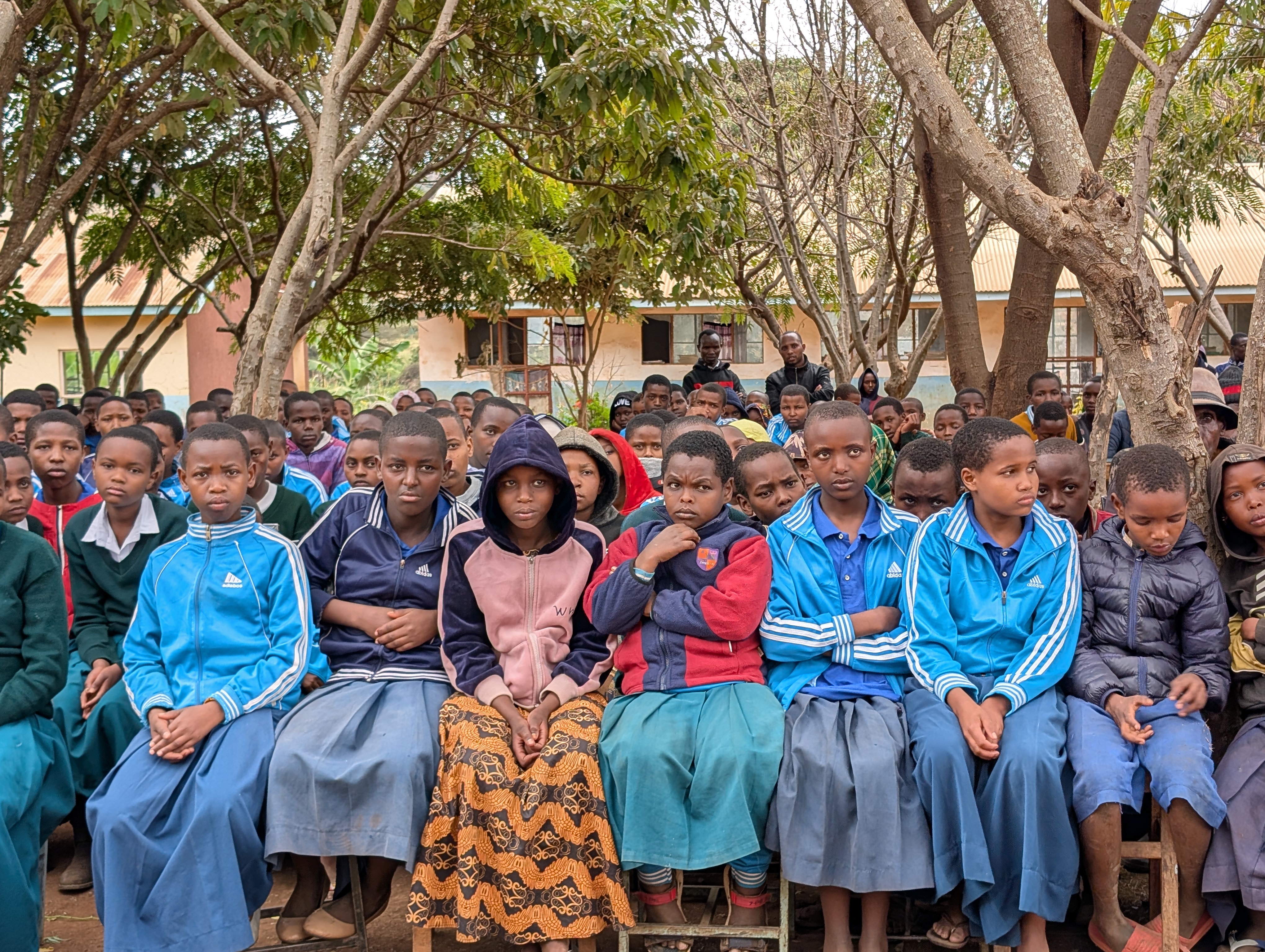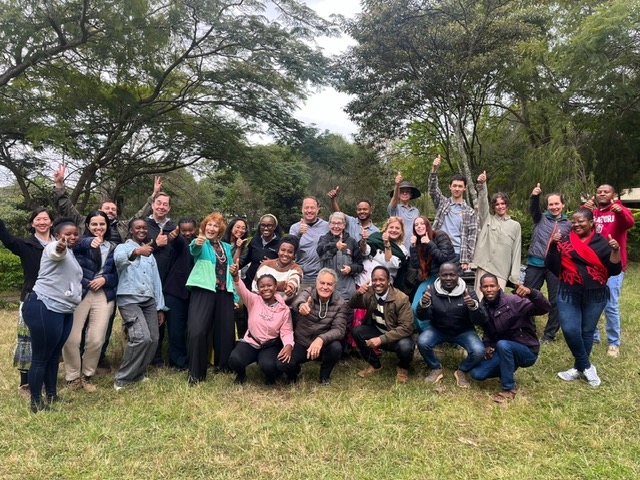Mutual Inspiration
"Bundling the addressing of different needs into a support system is crucial. For example, every morning some of my students come to school looking hungry, affecting their ability to learn, so now we feed them two meals a day. But they need more than books and good teachers and nutritious food. Quality classrooms and bathrooms and handwashing facilities are constant reminders of the kind of life you can have by working hard."
As Lorem Aminathia spoke by video conference with Don Stoll and Marianne Kent-Stoll, he did not imagine that he was explaining to the Karimu co-founders how development work should proceed. He knew that Karimu had been systematically addressing all of the different needs of low-income communities for nearly two decades. Instead, Lorem was telling Don and Marianne about the lessons he had learned from Karimu, which he is busily applying to his own development work in his native South Sudan. He spoke from the capital city, Juba, while Don and Marianne were half a world away, in Southern California.
"In Juba we see a lot of relics of water systems that were built by big nonprofits."
Don and Marianne nodded their heads at the smiling image on Don's laptop. They knew that billions of development dollars have been misspent because rich nonprofits have often had no maintenance plan. They bring boundless resources and good intentions but fail to involve the people they wish to benefit in their work. Thus, the intended beneficiaries often don't become invested in a development project. They had nothing to do with the project — it was built by the rich people who came here for a while and then went away. And they were rich, so maybe if the project crumbles, they'll come back and rebuild it.
But Karimu doesn't work in the same way that those rich nonprofits do. All Karimu's projects are requested and prioritized by the community, which must take part in project completion, and even make a legal commitment to maintenance before Karimu will lift a finger.
"To sustain water systems, we need the support of the local community," Lorem continued. "Development requires a lot of people to work together jointly, like Karimu gets people to do. The way Karimu has coordinated so many people to achieve things in so many different areas of development is inspiring."
He had mentioned water systems specifically, but only as an example to represent every kind of development work, including his own, in education. In Juba in 2024, he established Kinyeti Academy as an after-school program. Now it is a day school, enrolling thirty students between the ages of nine and fifteen. Lorem's goal for Kinyeti Academy is to train leaders for a country that achieved independence only in 2011 and whose twelve million residents must cope with widespread hunger and a lack of basic services.
He spoke with Don and Marianne one week after Vice-President Riek Machar was charged with murder, treason, and crimes against humanity — accusations dismissed by Machar's spokesperson as a "political witch-hunt" — provoking fear that the country's civil war could reignite.
Under the circumstances, his concern that many of his students might suffer from trauma seemed well-founded. But he had come up with a creative, community-based way to address their trauma: South Sudan is a predominantly Christian country, and Lorem was scouring the neighborhoods around Kinyeti Academy for a church that would be willing to offer pastoral care.
His resourcefulness had become clear to Don and Marianne in July, on Karimu's annual volunteer visit to Tanzania. He had joined the trip after Malcolm McKenzie, former Head of The Hotchkiss School, in Connecticut, where Lorem studied, put him in touch with Karimu volunteer Eduardo Lins Henrique. (Eduardo had hoped to persuade Hotchkiss students to travel to Tanzania.) In Tanzania, Lorem befriended Klaus Roder, a volunteer living in Northern California. It turned out that Klaus’s daughter, Livia, a high school student, works as a math tutor and has started a Math Olympiad program at her local library, where she teaches a weekly free class. Lorem was enthusiastic about connecting Livia with his students, so she now teaches math for Kinyeti Academy.

The Tanzanians also learned about Lorem’s resourcefulness — and much more. His life story, which he shared at gatherings organized for Don, Marianne, and Karimu's Chief Operating Officer, Nelson Mattos, had a dramatic effect on the villagers. At one gathering, a man who had listened raptly to Lorem's story stood up to address the village children and told them, "If this young man from South Sudan who lost his parents can succeed, then all of you should be able to succeed since you have the support of your families."

Lorem was born in 1990 in Sudan, near its southern borders with Uganda and Kenya, into a family that belonged to a relatively small ethnic group called the Didinga. At that time Sudan's area was almost as large as that of Alaska, Texas, and California combined, but the Second Sudanese Civil War, which would lead to the independence of South Sudan, had begun to tear the country apart. At age five Lorem contracted tuberculosis, and a year later his parents fled with him to Kenya to escape the terrors of the war. Because his paternal grandfather was a village chief and in poor health, his parents returned to Sudan so that his father could take over the grandfather's responsibilities.
"But they left me behind in a refugee camp. I don't know why. Maybe they thought I could get better treatment for my TB in Kenya. Maybe they thought Sudan would be more dangerous for me because of the war. Maybe both."
He never had the opportunity to ask why. He never saw his parents again. They did not survive the hardships of the Second Sudanese Civil War, which had begun in 1983 and did not end until 2005.
He had no family and conditions in the refugee camp were harsh.
"In the schools, water had to be sprinkled on the ground every day to keep the dust down. And the bathrooms were unbelievable."
But Lorem met the conditions head-on. He excelled as a student, eventually winning scholarships to acclaimed high schools in Kenya and South Africa, and then Yale. In between, he studied for a year at The Hotchkiss School on the recommendation of Yale's admissions office, to ease his transition. At Yale he received a B.A. in Economics in 2015. After that, funded by the prestigious Schwarzman Scholars program, he earned his Master's in Economics from Tsinghua University, in Beijing, in 2018.
His credentials qualified him to work in a rich country, in safe conditions, yet he chose to return to the explosive environment of his homeland, working for the United Nations Development Program before founding Kinyeti Academy.
"I feel a duty for the sake of my country's future."
Even before Vice-President Machar's arrest exacerbated tensions, the way forward for South Sudan had seemed perilous.
"USAID used to spend about $! billion a year here," Lorem says. "And I used to travel to the U.S. for fundraising, but all the visas from South Sudan are canceled."
The changes in the U.S. treatment of Lorem's country have come when Kinyeti Academy's funding need is urgent. He estimates that 70 percent of the country's school-age children do not attend school. However, even if that number is especially high right now, education has been a troubled area since independence.
"So it's challenging to find good teachers. We have to identify capable South Sudanese college graduates and train them ourselves, with the help of online training by One World Network of Schools. It's working, though: I'm happy to see a modest improvement in the reading speed of our students!"

Don and Marianne were delighted to hear Lorem say Karimu's work is inspiring. That was meaningful praise by someone who is himself such an inspiration.


